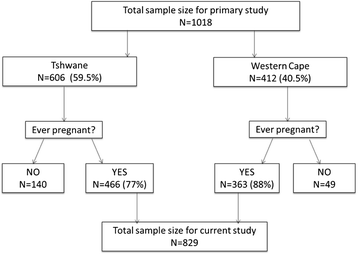Psychosocial factors associated with early initiation and frequency of antenatal care (ANC) visits in a rural and urban setting in South Africa: a cross-sectional survey
- PMID: 26810320
- PMCID: PMC4727269
- DOI: 10.1186/s12884-016-0807-1
Psychosocial factors associated with early initiation and frequency of antenatal care (ANC) visits in a rural and urban setting in South Africa: a cross-sectional survey
Abstract
Background: Late booking and infrequent antenatal care (ANC) are common but avoidable patient-related risk factors for maternal deaths in South Africa. The aim of the study was to examine the association of psychosocial factors with early initiation of ANC and adequate frequency of attendance of ANC clinics among women in an urban and rural location in South Africa.
Methods: Data from a 2006 cross-sectional household survey of 363 women from the rural Western Cape and 466 women from urban Gauteng provinces of South Africa for risk of alcohol-exposed pregnancy were analysed. We examined associations between psychosocial variables (self-esteem, cultural influences, religiosity, social capital, social support, pregnancy desire (wanted versus unwanted pregnancy), partner characteristics and mental health) and both early ANC first visit (before 16 weeks) and adequate frequency of ANC visits (4 or more visits) for respondents' last pregnancy.
Results: Overall prevalence among urban women of early ANC initiation was 46% and 84% for adequate ANC frequency. Overall prevalence among rural women of early ANC initiation was 45% and 78% for adequate ANC frequency. After adjusting for clustering, psychosocial factors associated with early ANC initiation in the urban site were being employed (OR 1.6; 95% CI 1.0-2.5) and wanted pregnancy (OR 1.8; 95% CI 1.1-3.0). For the rural site, early ANC initiation was significantly associated with being married (OR 1.93; 95% CI 1.0-3.6) but inversely associated with high religiosity (OR 0.5; 95% CI 0.3-0.8). Adequate frequency of ANC attendance in the rural site was associated with wanted pregnancy (OR 4.2; 95% CI 1.9-9.3) and the father of the child being present in the respondent's life (OR 3.0; 95% CI 1.0-9.0) but inversely associated with having a previous miscarriage (OR 0.4; 95% CI 0.2-0.8). There were no significant associations between adequate ANC attendance and the psychosocial factors in the urban site.
Conclusion: The majority of women from both sites attended ANC frequently but less than 50% initiated ANC before the recommended 16 weeks gestational age. Interventions to reduce prevalence of late ANC booking and inadequate ANC attendance should engage religious leaders, address unintended pregnancy through family planning education and involve male partners in women's reproductive health.
Figures

Similar articles
-
Exploring the pregnant women's perspective of late booking of antenatal care services at Mbekweni Health Centre in Eastern Cape, South Africa.Afr J Prim Health Care Fam Med. 2018 Jul 2;10(1):e1-e9. doi: 10.4102/phcfm.v10i1.1300. Afr J Prim Health Care Fam Med. 2018. PMID: 30035599 Free PMC article.
-
Prenatal care and uptake of HIV testing among pregnant women in Gambia: a cross-sectional study.BMC Public Health. 2020 Apr 15;20(1):485. doi: 10.1186/s12889-020-08618-4. BMC Public Health. 2020. PMID: 32293382 Free PMC article.
-
Determinants of late antenatal care presentation in rural and peri-urban communities in South Africa: A cross-sectional study.PLoS One. 2018 Mar 8;13(3):e0191903. doi: 10.1371/journal.pone.0191903. eCollection 2018. PLoS One. 2018. PMID: 29518082 Free PMC article.
-
Determinants of antenatal care utilisation in sub-Saharan Africa: a systematic review.BMJ Open. 2019 Oct 7;9(10):e031890. doi: 10.1136/bmjopen-2019-031890. BMJ Open. 2019. PMID: 31594900 Free PMC article.
-
First trimester antenatal care contact in Africa: a systematic review and meta-analysis of prevalence and contributing factors.BMC Pregnancy Childbirth. 2023 Oct 19;23(1):742. doi: 10.1186/s12884-023-06034-1. BMC Pregnancy Childbirth. 2023. PMID: 37858033 Free PMC article.
Cited by
-
"They must understand we are people": Pregnancy and maternity service use among signing Deaf women in Cape Town.Disabil Health J. 2017 Jul;10(3):434-439. doi: 10.1016/j.dhjo.2017.03.016. Epub 2017 Apr 6. Disabil Health J. 2017. PMID: 28416204 Free PMC article.
-
Assessing Community Acceptance of Maternal Immunisation in Rural KwaZulu-Natal, South Africa: A Qualitative Investigation.Vaccines (Basel). 2022 Mar 10;10(3):415. doi: 10.3390/vaccines10030415. Vaccines (Basel). 2022. PMID: 35335047 Free PMC article.
-
Determinants of early antenatal care booking among pregnant mothers attending antenatal care at public health facilities in the Nole Kaba district, western Ethiopia: unmatched case-control study.BMJ Open. 2023 Oct 24;13(10):e073228. doi: 10.1136/bmjopen-2023-073228. BMJ Open. 2023. PMID: 37879687 Free PMC article.
-
Socioeconomic inequalities and determinants of maternal health services in Shaanxi Province, Western China.PLoS One. 2018 Sep 5;13(9):e0202129. doi: 10.1371/journal.pone.0202129. eCollection 2018. PLoS One. 2018. PMID: 30183720 Free PMC article.
-
Antenatal Care Practices Among Hard-to-Reach Fishing Communities on Lake Victoria: A Community-Based Cross-Sectional Survey.J Prim Care Community Health. 2020 Jan-Dec;11:2150132720923101. doi: 10.1177/2150132720923101. J Prim Care Community Health. 2020. PMID: 32450758 Free PMC article.
References
-
- Hoque M, Hoque E, Kader SB. Audit of antenatal care in a rural district of KZN, South Africa. SA Fam Pract. 2008;50:66a–66d.
-
- Saving Mothers 2008–10: National Committee for Confidential Enquiries into Maternal Deaths . Saving Mothers 2008–2010: Fifth report on Confidential Enquiries into Maternal Deaths in South Africa. Pretoria: National Department of Health; 2012.
-
- World Health Organization, United Nations Children’s Fund, United Nations Population Fund, The World Bank . Trends in maternal mortality: 1990–2008. Geneva: World Health Organization; 2010.
-
- Villar J, Bergsjo P. WHO Antenatal Care Randomized Trial: Manual for the Implementation of the New Model. Geneva: WHO; 2002.
-
- Bamford L. Maternal, Newborn and Child Health. In Padarath A, English R (editors) South African Health Review 2012/13: Durban. Health Systems Trust. 2013. http://www.hst.org.za/sites/default/files/SAHR2012_13_lowres_1.pdf
MeSH terms
Grants and funding
LinkOut - more resources
Full Text Sources
Other Literature Sources
Medical

